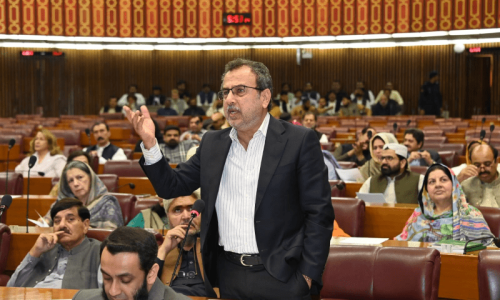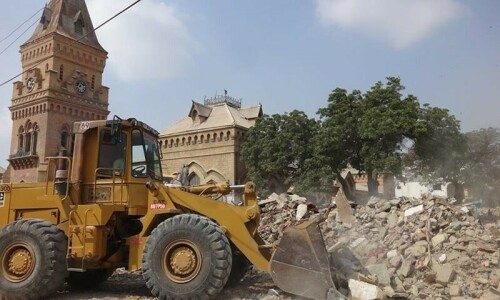KARACHI: Expressing his resolve to provide clean drinking water to the people of Sindh, Chief Minister Syed Murad Ali Shah has ordered the authorities to make functional all water supply schemes and reverse osmosis (RO) plants within a month.
He also directed the health department to complete the upgrade of 13 taluka hospitals to district headquarters hospital (DHQs) by December.
The chief minister issued these directives while chairing two separate meetings pertaining to public health engineering and health departments at the CM House on Wednesday.
CM orders authorities to make all water supply schemes functional in a month
The public health engineering department (PHED) is responsible for establishing, operating and maintaining water supply and drainage schemes.
818 water filtration plants non-functional
The CM was briefed that there were 2,109 water filtration plants, including 1,620 RO plants, and 818 of them were non-functional.
Mr Shah said that the plants not functioning for want of electricity should be converted to solar energy. He asked the chief secretary to get all required funds released from the finance department to make all such schemes functional.
He was informed that there was total 5,091 water supply and drainage schemes and 2,494 of them were non-functional and 244 of them had been abandoned.
He said that it was also decided to contract out operation and maintenance (O&M) of all RO plants through competitive process and directed the finance department to provide necessary funds for the purpose.
“I want you to monitor and evaluate O&M through district oversight committees (DOCs) to be notified by the chief secretary,” he said.
The CM was informed that all the RO plants would be installed with RO meters and sensors within a month and that the terms of reference of the DOCs, including a fortnightly report relating to the operation and maintenance of the scheme and plants, should be sent to the PHED secretary.
Chief Secretary retired Major Azam Suleman informed the chief minister that in light of a Supreme Court order all water supply and drainage schemes had been transferred to the PHED.
Appointment of 5,307 doctors, paramedics ordered
The CM directed the health department to complete upgrade of 13 taluka headquarters hospital (THQs) to DHQs by December.
He also sanctioned a “hard area allowance” to doctors serving in remote areas.
Mr Shah said that some positive results had been achieved from the health emergency he had declared during his previous tenure.
“We have to continue our efforts in a more energetic and effective way for improving health services, capacity building of doctors and improving medical education system,” he said.
Briefing the CM, Health Secretary Dr Usman Chachar said that there was a sanctioned strength of 67,876 doctors and paramedics in the health department against which 62,569 were working and there was a shortage of 5,307 doctors and paramedical staff. The vacant positions include 2,929 doctors of general cadres; 492 doctors of specialist cadre; 129 dentists; 10 pharmacists; nine drug administrators; 210 nurses; 1,214 paramedics and 1,295 lady health workers (LHW).
The CM asked the health department to fill vacant positions so that under-construction health facilities could be made functional.
17 THQs being upgraded
The meeting was informed that under special initiatives of the CM 17 THQs were being upgraded to the level of DHQs. The hospitals are located in Tando Mohammad Khan, Tando Allahyar, Jamshoro, Khairpur, Badin, Shikarpur, Mithi, Thatta, Dadu, Naushahro Feroze, Mirpurkhas, Sanghar, Mirpur Mathelo, Matiari, Qambar-Shahdadkot, Umerkot and Kashmore.
It was also pointed out that there were 206 primary health facilities in Sindh, which include 138 rural health centres, 810 basic health units, 883 dispensaries, 89 mother care health centres, two homeopathic dispensaries, eight urban health centres, 44 unani shifa khana, 42 maternity homes.
The CM was told that out of 2,016 health facilities, 1,032 were being run by Peoples Primary Healthcare Initiative (PPHI), 821 by the health department and 163 on public-private partnership (PPP) mode.
Out of 109 secondary and tertiary healthcare facilities, 95 are being run by the health department while 14 were operating under the PPP mode.
The Sindh government has five medical universities, eight medical colleges, four dental colleges, 21 nursing schools, five public health schools, 16 community midwifery schools, two nursing colleges, four paramedical institutes, one physiotherapy school, two health technician schools and seven institutes.
The health secretary said that 12 programmes/projects were in progress in health sector, including expanded programme on immunisation, LHWs programme, maternal neonatal child health programme, TB control programme, prevention and control of hepatitis, prevention and control of blindness, malaria control, nutrition support, enhanced HIV/AIDS control, dengue control and prevention, accelerated action and diabetic control programmes.
The chief minister directed the health department to update him on a weekly basis.
Health Minister Dr Azra Pechuho assured the CM that she would also be monitoring the progress of these programmes.
Published in Dawn, August 30th, 2018














































